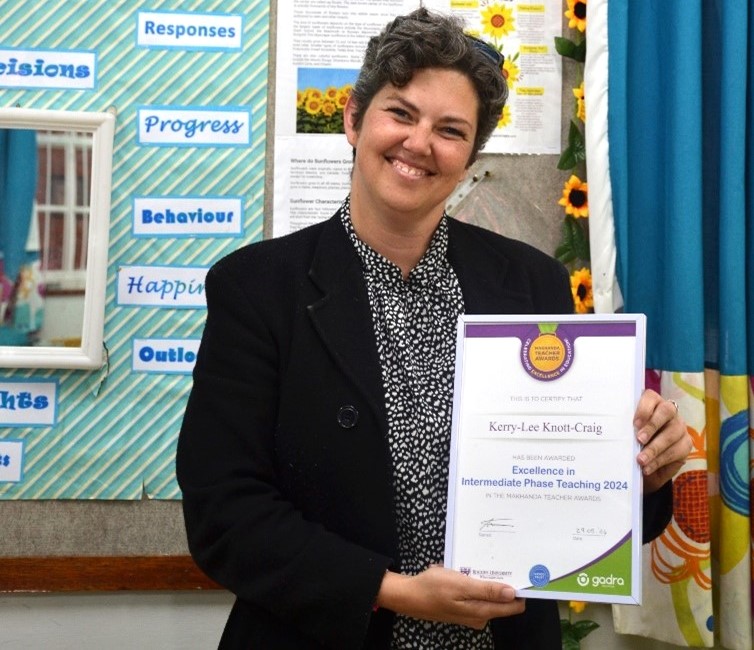By Relebohile Mohapi
I am in awe.
I watch a teacher roll on the floor with her learners, showing them how to execute the dance move flawlessly. Her 13-year-old learners watch intently to reproduce the exact move she has just made. The girls gaze at her with trust in their eyes and fluid limbs.
I can’t help but think back to yesterday when I questioned her in her colourfully-decorated classroom about her teaching journey. She retains the bright smile which greeted me the day before. Her energy remains the same: excited and ready to tackle the task ahead.
Kerry-Lee Knott-Craig had invited me to watch her grade 7’s rehearse for an upcoming performance. This allowed me to see the ‘dancing queen’ in action.
She recently won a shared award for intermediate teaching at the first-ever Makhanda Teaching Awards. She exclaims excitedly that she feels honoured to have won the award and receive acknowledgement for her work. She knows she will have to supersede expectations now, but she is ready for the challenge.
Knott-Craig has taught at Victoria Girls Primary School for over ten years. Her school days begin with a 15- or 30-minute reading time where the learners read for pleasure. This activity affords the learners time to centre themselves and prepare to learn. Kerry knows the importance of reading for pleasure and has seen the tremendous love her learners have for it.
She harnesses her passion and talent for dance by teaching it to Grade 7s – something she greatly enjoys. “I always wanted to be a dance teacher,” Knott-Craig says. Indeed, she started as a dance teacher in the Western Cape but transitioned to an academic teacher with a dab of dance later on.
She incorporates dancing in her classroom when they take ‘brain breaks’. A brain break is a 5-minute rest time for Kerry and her learners to dance or stretch before they return to work. This break allows the learners to concentrate better, and it helps those with ADHD to recentre their focus back to learning.
Knott-Craig takes deliberate lengths to ensure that she accommodates all of her learners. She allows those with auditory issues to have headphones on when needed. She has reading strips for differently-abled learners with dyslexia and ADHD to keep track of and follow along with their reading. “I feel like we are faced with more and more students with neurodiversity, and we need to start changing how we approach our subjects,” she says.
Knott-Craig hopes that winning this award will allow her to branch out and connect with other teachers. She believes in collaborating to share resources so that they can benefit the community: “There’s no point in some schools steamrolling ahead and leaving a whole lot behind when we can support each other”. She knows that education has to improve in Makhanda, and she is doing her bit to make that happen.
Finding balance is essential to achieve anything. Knott-Craig acknowledges balancing being a parent and teaching is tricky, but she strives to achieve it daily.
Her advice to new teachers entering the field is to: “Find your marigold, and make sure that you are someone else’s marigold.” Find someone who supports you and helps you grow, she advises. You are not alone; ask for help and be someone else’s help.


